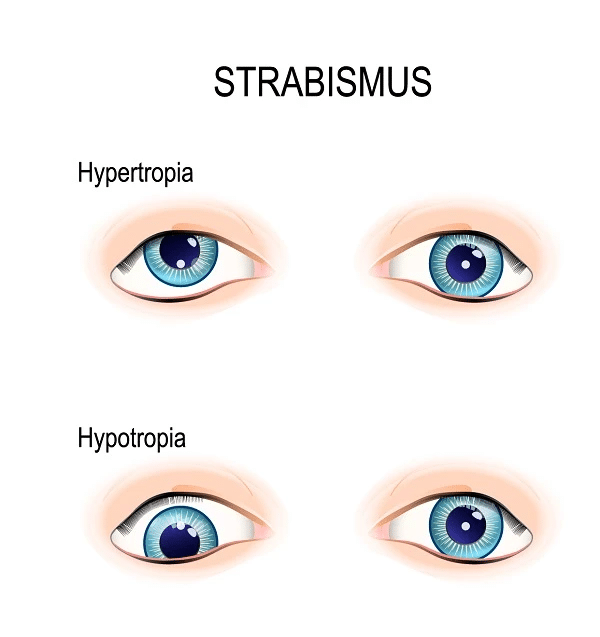Why do my eyes point in different directions?
If your eyes do not point in the same direction then it’s likely you are suffering from strabismus. If you suffer from this condition, then one eye will look directly at the object you are viewing, but the other is misaligned inward, otherwise known as cross-eyed or wall-eyed. Strabismus can be either intermittent or constant.

The misalignment can also always affect the same eye known as unilateral strabismus, or the two eyes could take turns being misaligned, known as alternating strabismus.
Let’s consider some of the main causes of this condition and how to deal with them.
Accommodative Esotropia
Occasionally, when a child is farsighted and they try to focus to compensate for uncorrected farsightedness, they will develop a type of strabismus known as accommodative esotropia, where the eyes cross due to the excessive effort in focusing.
This condition will typically appear before they are two years old, but it can also occur later on in childhood. In most cases, this condition can be corrected with contact lenses or eyeglasses.
Usually, the only effective treatment for this condition is strabismus surgery. The success of this surgery will depend on many factors, including the magnitude and direction of the eye turn. The earlier the surgery can be performed, the higher the success rate.
In some cases of small-angle and intermittent strabismus, it can be possible to improve eye alignment via a non-surgical procedure with vision therapy. In most cases, this can be an effective treatment for this strand of strabismus.
Cranial Nerve Palsy
If your eyes point in different directions, it could also be an indication of Palsy (partial or full paralysis) of the third, fourth or sixth cranial nerves. This can result in difficulty with moving the eye which results in the symptom you are experiencing.
Additional symptoms include:
- double vision
- reduced depth perception, ptosis
- a dilated pupil that doesn’t respond to light
- vision loss and head tilting.
The cause of this condition includes diabetes, head trauma, tumours, aneurysms and more.
When to see your local independent optician
If your eyes are pointing in different directions, it’s best to make an appointment with an optician right away just to get a comprehensive diagnosis.
Due to the range of different types of strabismus, it’s important you receive a proper diagnosis and find out the next steps in treatment suitable for your specific condition.
Related articles





